5 Best Vitamins for Hair Growth in 2025
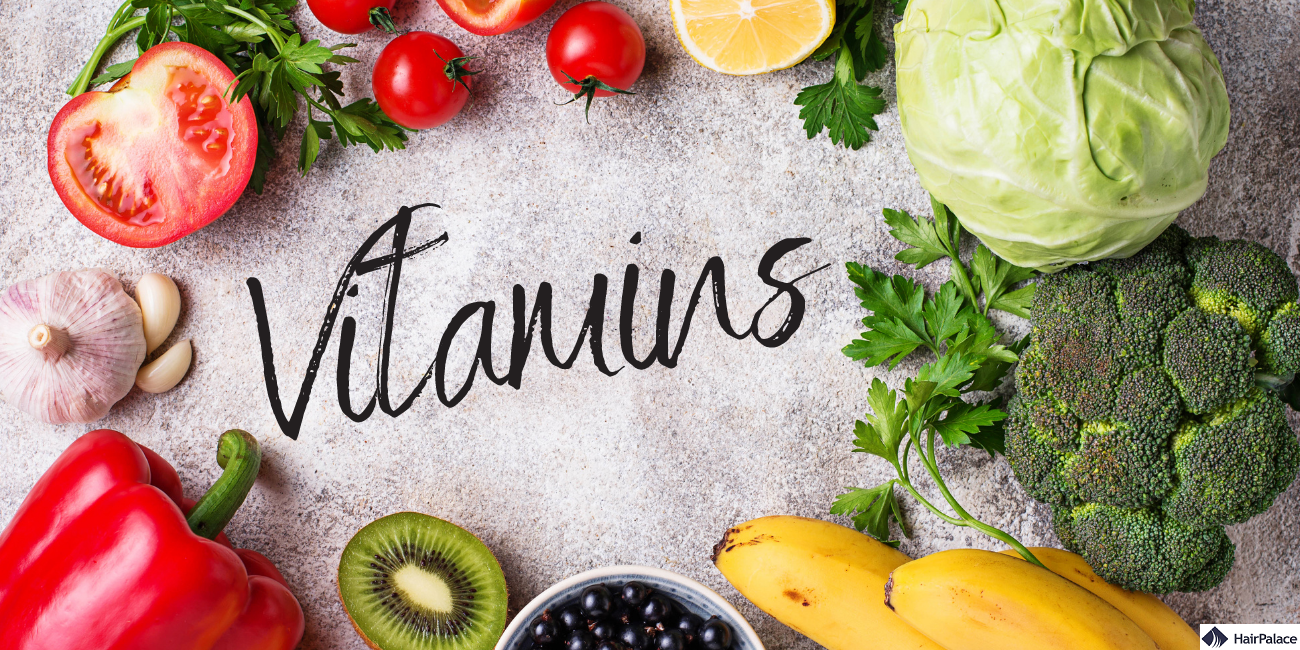
A growing number of studies are linking hair loss conditions like alopecia and male pattern baldness to vitamin deficiency and poor nutrition.
Vitamins are the building blocks of a healthy body, after all. And even if they don’t directly affect hair loss, they influence several systems that support hair growth.
Today, we’ll explore everything you need to know about vitamins and their relationship with hair growth and subsequent hair loss.
We’ll highlight all the vitamins you should prioritize and also recommend ways to include them in your diet naturally.
We’ll also explore popular supplements on the market so that you can decide what solution is best for you.
The 5 best vitamins for hair growth and thickness
We’ve researched the key vitamins that can yield the best results for your hair growth journey.
These vitamins can contribute to healthier, stronger hair when included in your diet through foods or supplements.
They are in alphabetical order:
1. Vitamin A for hair
Is vitamin A good for hair growth?
Vitamin A is essential for healthy eyesight, immune system, cardiovascular system, skin, and hair.
It does this by helping cells produce sebum, which keeps your hair follicle well moisturized.
You can increase your Vitamin A intake by focusing on the following foods:
- Leafy greens like kale, spinach, and broccoli
- Vegetables like carrots and sweet potatoes
- Dairy products like milk
- Fish oils
That said, Vitamin A is powerful, and too much can actually trigger hair loss.
Some studies found that women with higher levels of Vitamin A experienced sudden hair shedding, for example.
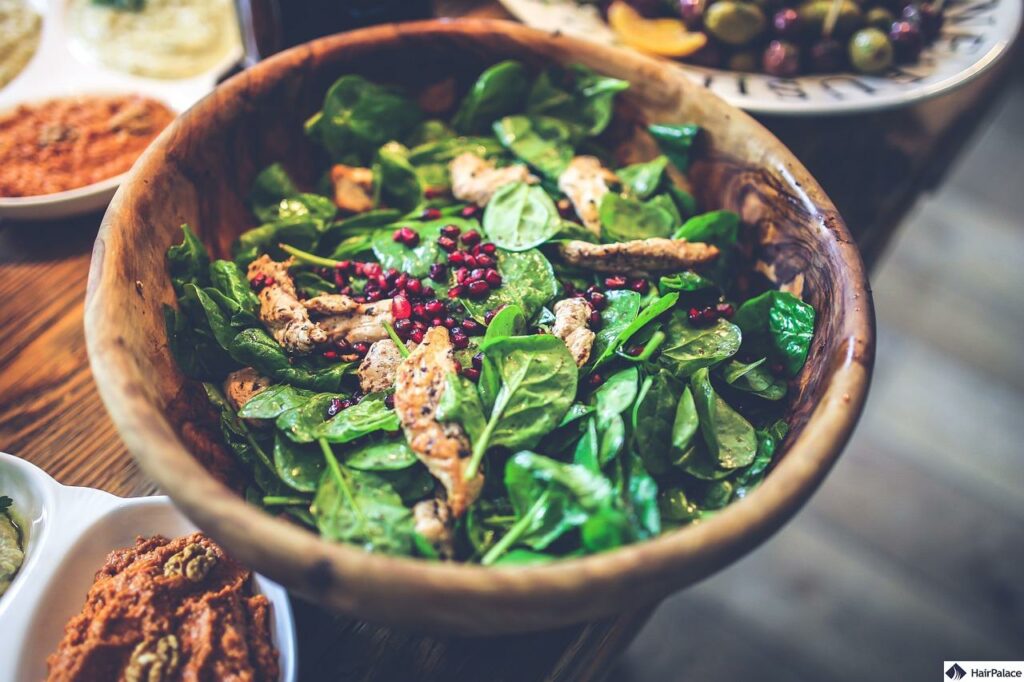
2. Vitamin B for hair
B Vitamins are a group of essential vitamins that play a pivotal role in cell metabolism, brain function, and the creation of red blood cells that carry oxygen.
Many vitamins in this grouping deserve your attention, including B1 (Thiamine), B2 (Riboflavin), and B12 (Cobalamin).
But there’s one in particular known to effectively boost hair growth a vitamin called biotin, also known as B7.
Biotin helps stimulate keratin production, a protein that makes up the hair follicle’s bulk.
Additionally, biotin increases the rate of growth in the hair follicle.
Biotin is water-soluble, meaning any extra vitamin will simply pass through your body as urine and not be absorbed.
For this reason, eating foods rich in biotin can help you reach a helpful level.
Consider the following foods to absorb more B vitamins:
- Nuts and seeds, like walnuts, peanuts, and sunflower seeds
- Egg yolks
- Avocadoes
- Sweet potatoes
3. Vitamin C for hair
Vitamin C is a crucial vitamin that helps our bodies repair themselves from damage, especially against free radicals (unstable atoms that damage cells).
It also stimulates collagen production, encouraging hair growth and improving appearance and texture.
Finally, it also helps absorb iron more effectively, improving circulation and the nourishment hair follicles can receive.
Similar to biotin supplements, it cannot be stored in our body; eating the following foods can help improve your levels:
- Citrus fruits like orange, lemon, grapefruit, and orange juice
- Fruits like strawberries and tomatoes
- Cruciferous vegetables like broccoli, cabbage, and cauliflower
- White potatoes
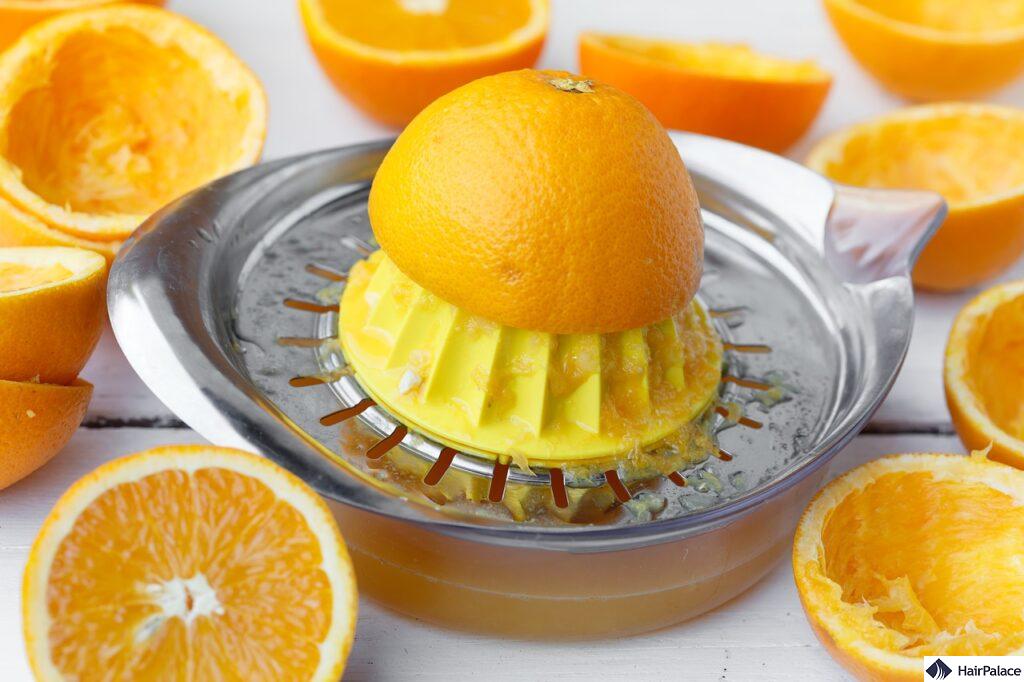
4. Vitamin D
Vitamin D is linked to healthy teeth, bones, and muscles.
And although its connection to hair health remains unclear, some studies have found that those suffering from alopecia areata also are deficient in this vitamin.
Because vitamin D hair loss has become a common phenomenon, hair care specialists often treat it as a potent source of hair nutrition.
Although direct sunlight can help encourage the production of Vitamin D in your body, you must remember not to overdo it – prolonged sun exposure can damage vulnerable hair.
Consider the following foods to introduce more Vitamin D into your lifestyle:
- Oily fish
- Red meat
- Egg yolks
- Liver
- Whole grains like oatmeal and quinoa
- Vitamin D supplements
5. Vitamin E
Vitamin E is a group of eight compounds that help our eyesight, blood, brain activity, and immune system and improve skin and hair quality and condition.
Some studies have shown promising results of Vitamin E and its effect on damaged hair.
For example, one study showed that participants taking tocotrienol supplements (Vitamin E oil for hair) reported a 34.5% increase in hair counts in just eight months. Foods rich in Vitamin E include:
- Nuts and seeds like peanuts and almonds
- Sunflower and olive oil
- Fruits like mango
- Red sweet peppers
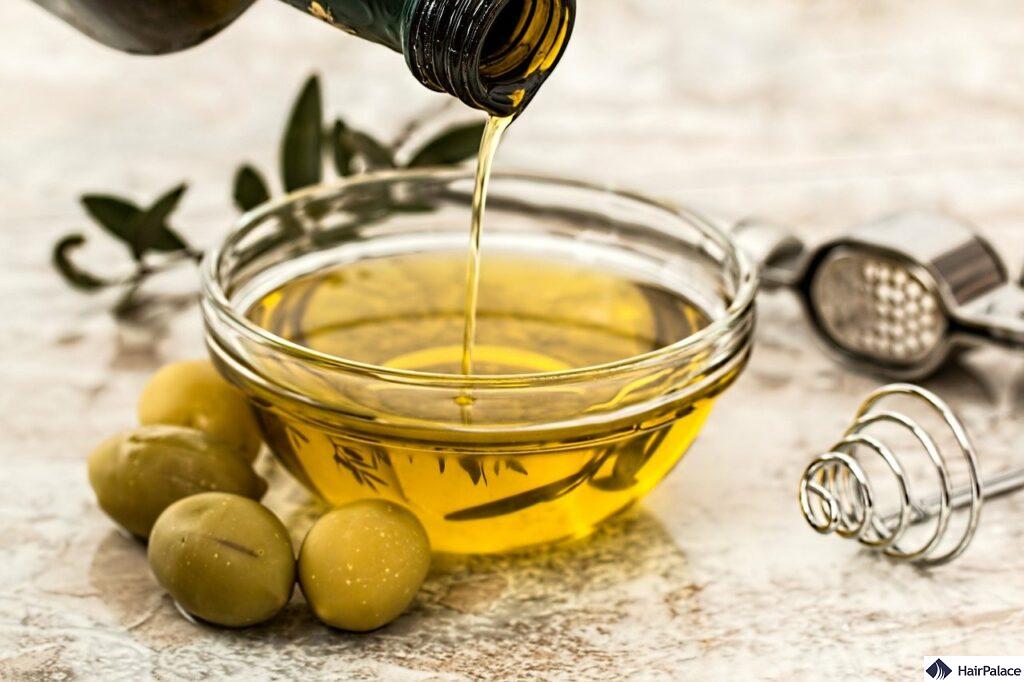
3 other nutrients to improve hair growth
Although certain vitamins are crucial ingredients for a healthy body and mind, there are other ways your diet can help new hair grow.
Let’s take a quick look at three other critical nutrients:
1. Protein
Often regarded as the building blocks for a healthy body, protein is one of the essential nutrients to grow healthy, strong, resilient hair.
Not only does protein help create stronger hair, but it’s instrumental in repairing damaged cells in our body and regulating both hunger and hormone levels.
It also plays a pivotal role in helping you build muscle.
Without protein, your body will become considerably weakened. Skin, nails, and hair will all suffer. To prevent this, consider protein-rich foods like:
- Nuts and seeds like almonds, walnuts, sesame, and pumpkin seeds
- Dairy foods like cottage cheese, greek yogurt, and milk
- Whole grains like oatmeal and quinoa
- Lean meat, including beef, lamb, and pork
- Poultry, such as chicken and turkey
- Legumes and beans, like quinoa and lentils
- Eggs
- Fish
- Whey protein supplements
If you suffer from a protein deficiency, you may suffer from an increased period of hair shedding known as telogen effluvium.
Hairs enter the telogen, or resting phase, earlier than intended.
This disruption to the hair growth cycle can result in vast areas of hair appearing thin, brittle, and falling out prematurely.
2. Zinc
Another vital nutrient for your body is zinc. If deficient in zinc, your body will become incredibly vulnerable to disease, infections, and poor wound healing.
Your skin, in particular, will suffer terribly and may crack and dry up like a rash.
This can cause early hair loss around your body as skin becomes tender and sensitive.
Furthermore, some studies have shown that those suffering from alopecia or male pattern baldness report low zinc levels in their diets.
To improve your zinc intake, consider increasing the following foods in your diet:
- Red meat
- Poultry
- Eggs
- Nuts and seeds like cashew nuts, almonds, pumpkin, and flax seeds
- Dark chocolate
- Legumes like chickpeas and beans
- Zinc supplements
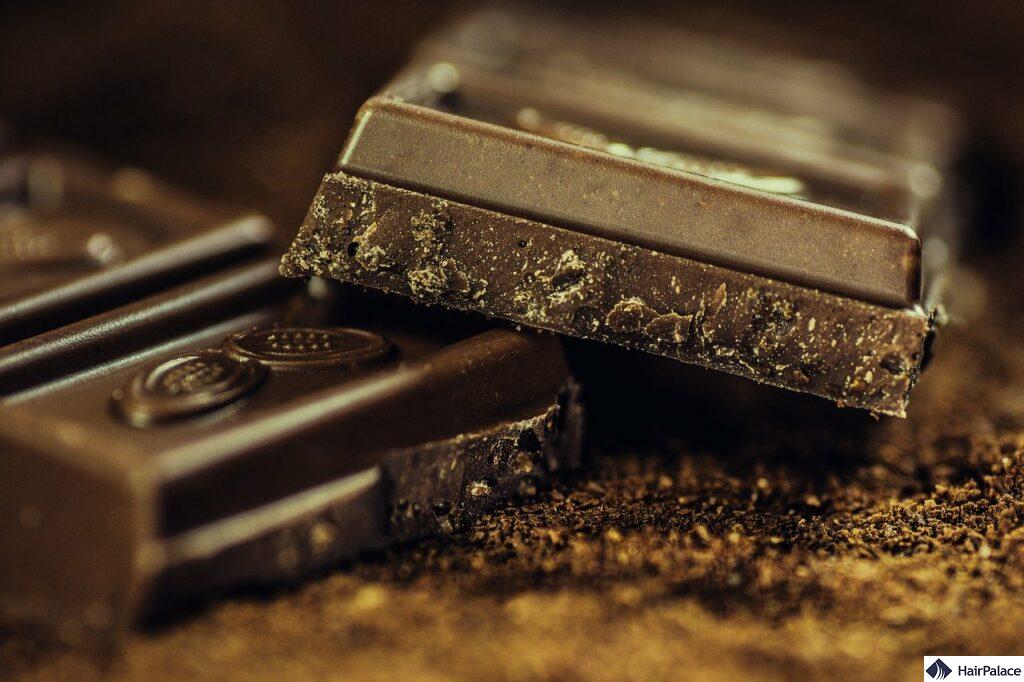
3. Iron
Iron is one of the cornerstones of a healthy body and mind.
It does so much, including producing red blood cells that carry oxygen and nutrients around your body.
It also helps maintain a healthy immune system and regulates body temperature.
Iron deficiency is commonly linked to hair loss conditions, including diffuse hair loss (thing hair).
Some research says that iron deficiency’s effects on hair can be on the same level as genetic conditions like male pattern baldness.
To combat an iron deficiency, consider the following foods:
- Red meat
- Nuts and seeds
- Legumes like chickpeas and red kidney beans
- Cruciferous leafy greens like broccoli and spinach.
It is important to note that taking too much iron has been linked to feeling nauseous, stomach pains, and constipation.
The recommended daily iron intake, as per the NHS website, is 20mg.
If you are in doubt about the amount of iron in your diet, consult with a medical professional.
Comparison of the best supplements for hair growth
| Product | Price | Amazon reviews | Vegan-friendly |
|---|---|---|---|
| Nutrafol | £ 75 | 4.0 based on 34 Amazon reviews | |
| Viviscal | £ 95 | 4.3 based on 1304 Amazon reviews | |
| Thorne Collagen Plus | £ 50 | 4.7 based on 654 Amazon reviews | |
| Pure B-Complex Plus | £ 39 | 4.5 based on 127 Amazon reviews | |
| Pure Vitamin D3 Liquid | £ 29 | 4.2 based on 18 Amazon reviews |
5 of the best supplements to encourage hair growth
Recently, there has been a dramatic increase in the number of supplements in the hair care market.
Many companies promote hair growth vitamins as the only solution you can try.
We’ve researched all supplement brands and found five of the best products in terms of price, ingredients, whether they’ve been third-party tested, or more.
1. Nutrafol
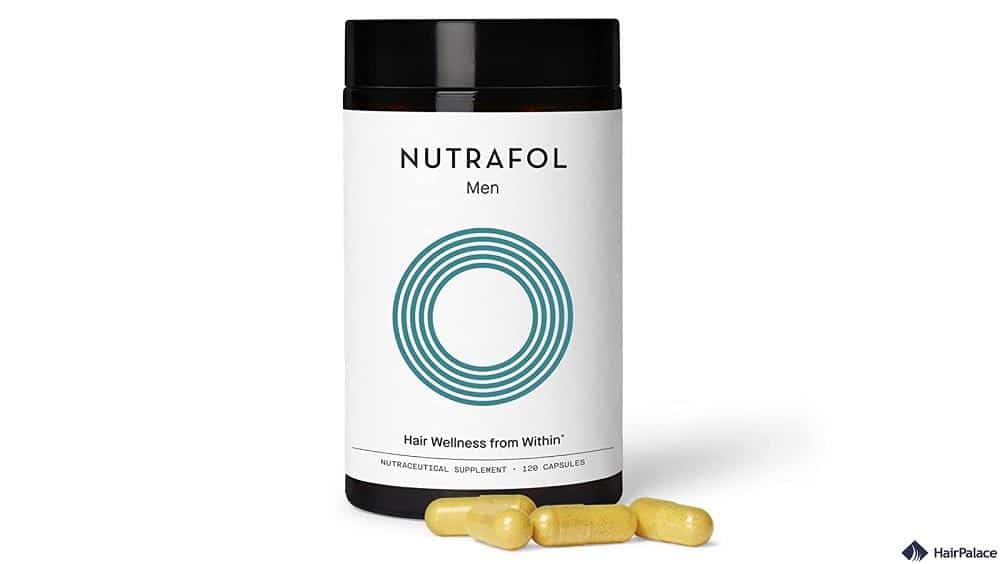
- Price: £ 75
- Reviews: 4.0
- Dose: 4 capsules per day
- Active ingredients: biotin, iodine, zinc, selenium, collagen, sensoril, ashwagandha, saw palmetto, curcumin extract, full-spectrum palm extract, hyaluronic acid, L-cysteine, L-lysine, L-methionine, keratin, horsetail, Japanese knotweed extract, black pepper extract, capsicum extract, and vitamins A, C, and D
Because of its diverse ingredients, including various beneficial vitamins and supplements, Nutrafol claims to be a highly effective solution for thinning hair and hair regrowth.
The company has said that the pills work by reducing dihydrotestosterone (DHT), a harmful hormone responsible for hair loss, as it shrinks follicles over time.
Additionally, Nutrafol contains adaptogens, natural ingredients that help your body respond to tension, anxiety, and fatigue. Overall, it can help you manage rising stress levels in your life.
2. Viviscal
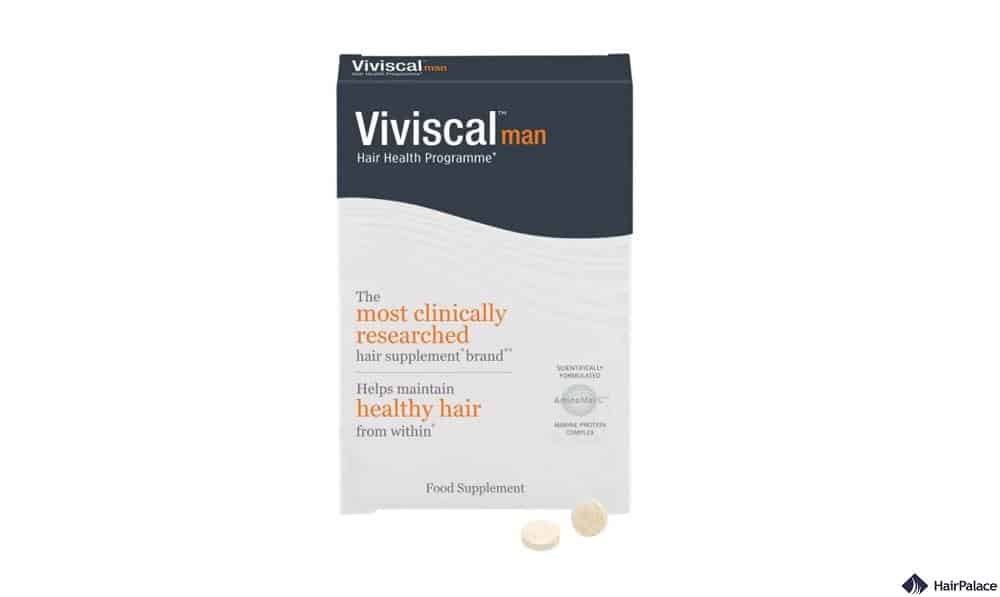
- Price: £ 95
- Reviews: 4.3
- Dose: 1 tablet twice a day
- Active ingredients: biotin, zinc, niacin, calcium, iron, collagen, horsetail, millet seed extract and vitamin C
Next on our list is Viviscal, which contains marine collagen from sharks and molluscs, and is thought to help promote and stimulate new hair growth.
It’s believed that these two ingredients are how Inuits grow incredibly thick, strong hair.
The product also contains some of the best vitamins for hair loss, including biotin, zinc, niacin, and calcium.
This ensures you receive a diverse nutritional boost to your diet.
That said, if you are allergic to shellfish, you must avoid using this product, as it could potentially trigger a reaction.
3. Thorne Research Collagen Plus
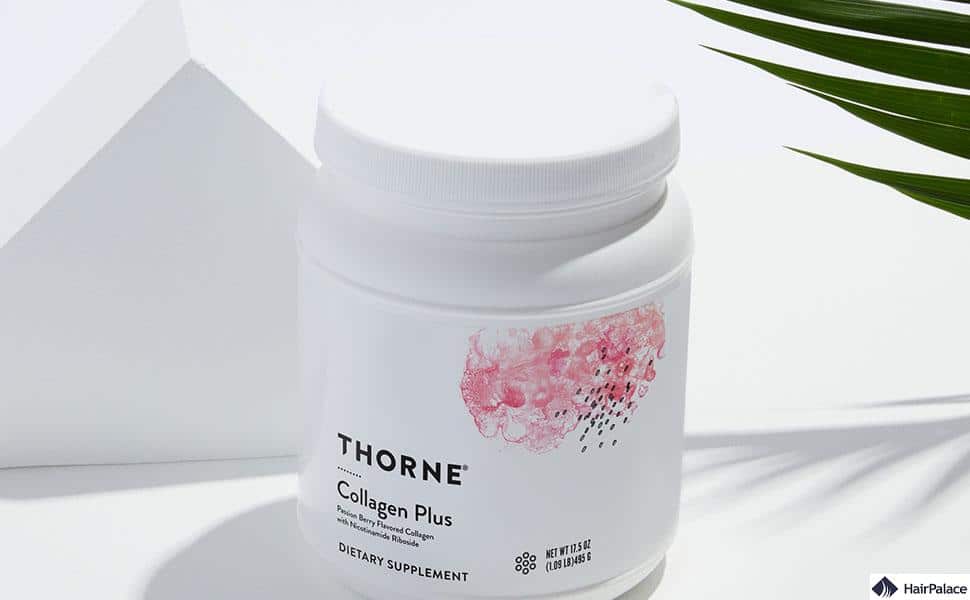
- Price: £ 50
- Reviews: 4.7
- Dose: 1 scoop (16.5 grams) per day
- Active ingredients: collagen, nicotinamide riboside hydrogen malate, betaine anhydrous, fruit extract
In recent years, collagen has become one of the most popular supplements for people who want to improve their hair, skin, and nails in one treatment. But research is still growing.
If you’re interested in exploring the effectiveness of collagen for yourself, this product from Thorne has been specially designed to support improved hair production and function.
It contains a combination of collagen peptides and plant-based antioxidants.
Moreover, this powder contains nicotinamide riboside, which is similar to a B vitamin in that it can help improve cell repair and signs of ageing.
4. Pure Encapsulations B-Complex Plus
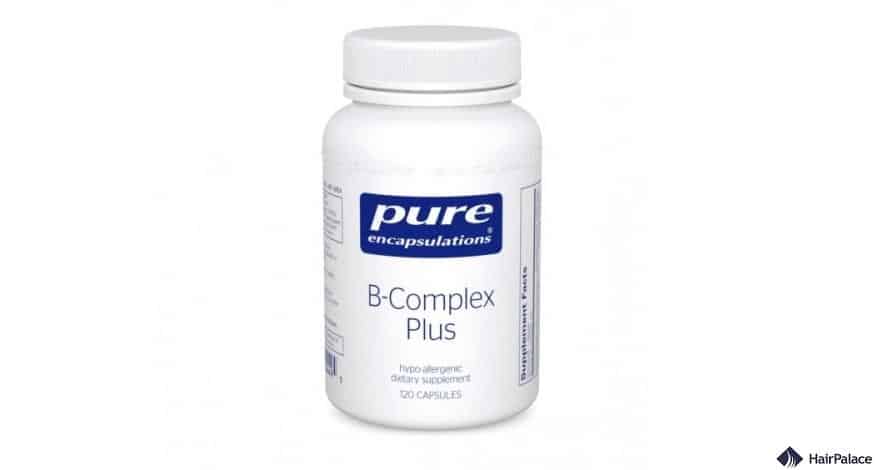
- Price: £ 39
- Reviews: 4.5
- Dose: 1 capsule per day
- Active ingredients: thiamine, riboflavin, niacin, vitamin B6, folate, vitamin B12, biotin, pantothenic acid
As we’ve already said, the vitamin B family can greatly influence promoting healthy hair growth and combating hair loss.
This complex supplement contains all eight B vitamins, including folic acid, which adds volume, and B6, which helps transport amino acids directly to vulnerable hair.
Research is still ongoing to say if a combination of Vitamin B supplements supports hair growth, especially in people who are not deficient in them.
Secondly, although B vitamin toxicity is rare, you should consult a medical professional when taking on a new supplement that contains as many different compounds as this.
5. Pure Encapsulations Vitamin D3 Liquid
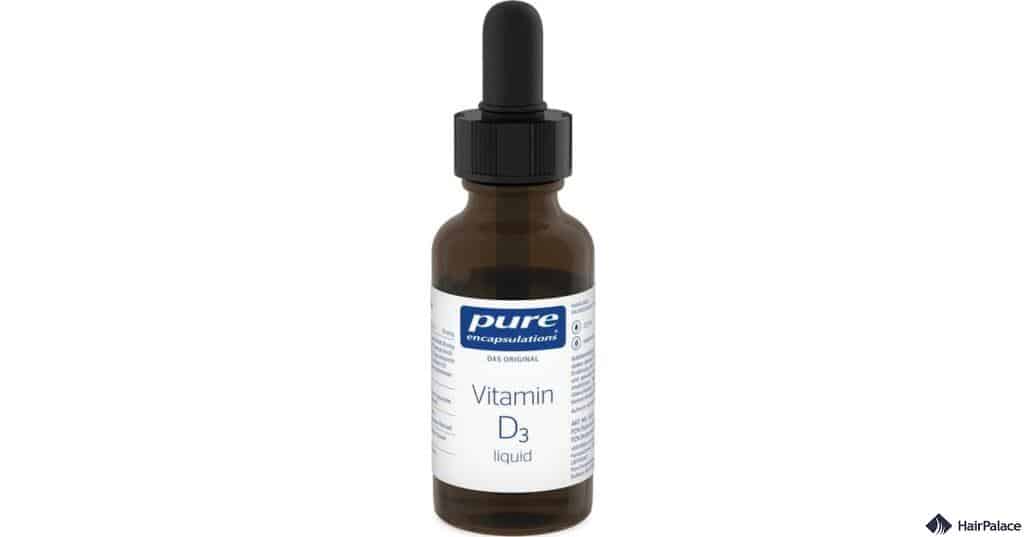
- Price: £ 29
- Reviews: 4.2
- Dose: 5 drops per day
- Active ingredients: vitamin D3
Vitamin D deficiencies have been linked to hair loss, so this liquid product from Pure can be of major interest to you.
After all, a lack of Vitamin D in hair follicles means they cannot regulate proper growth and shedding.
Every daily dose promises up to 1,000 IU of Vitamin D3, harvested from lichen, making it vegan-friendly and free from major allergens.
Moreover, this product is third-party tested, so many people buy it with confidence.
It is often regarded as one of the best Vitamin D supplements on the market.
How to choose the best hair vitamins for men
Supplements containing various vitamins and minerals have become incredibly popular in recent years.
Every day, new products emerge, and it’s not easy knowing which will work best for you.
When shopping for new products, consider the following:
- Your goals: As research suggests, vitamin supplements can only do so much. If you have experienced significant or total hair loss, they might not be the best course of treatment to restore your hairline. That said, if you are in the early stages of hair loss or thinning, a supplement might be just the support system your hair needs.
- Health: Consuming too many vitamins can harm your health, including worsening hair loss. Always consult your doctor or a healthcare professional for guidance on what you should add to your diet.
- Third-party testing: This ensures supplements are safe and that the labels accurately represent what’s being sold.
- Cost: This undeniable factor can dictate what you buy and from where. Remember, supplements are not a permanent solution; you may have to stay on the best vitamin for hair growth to sustain results.
How else can you stimulate hair follicles?
While an increase in vitamins and improvement in your nutrition can yield positive results for your hair and general health, there’s no definite guarantee of results.
You could take these products and see no visible changes to your hair.
Other alternatives include:
But if you want a permanent solution to your hair loss troubles, you should consider hair transplantation.
The most popular procedure type is the Follicular Unit Extraction method (FUE).
It sees a highly-skilled surgeon extract healthy hair follicles from your head’s back and sides and place them strategically into balding areas.
Vitamins for Hair Growth FAQ
They may only help hair growth if you have a poor diet. That said, there is no concrete proof to suggest taking supplements will reduce hair loss if the cause of your condition is something other than a vitamin deficiency.
Hair growth is very slow, working at about half an inch per month. As such, supplements do not simply work their magic overnight. It takes time, patience, and consistent use to achieve noticeable results – sometimes as long as five years!
Overloading your body with vitamins and minerals can negatively affect your hair. Research has shown that too much Vitamin A or mineral selenium can cause premature hair loss. So while you think you’re helping your body, some supplements could have the opposite effect.
For hair growth, several vitamins are beneficial:
-Vitamin A
-Vitamin B (including Biotin, also known as Vitamin B7 or Vitamin H)
-Vitamin C
-Vitamin D
-Vitamin E
-Folic Acid (sometimes categorized under Vitamin B)
-Niacin (Vitamin B3)
These vitamins support healthy hair growth by contributing to various functions like sebum production, cell growth, collagen formation, and nutrient circulation in the scalp.
Last medically reviewed on March 27th, 2025
- Yeo J, Jung G, Tarakanova A, Martín-Martínez FJ, Qin Z, Cheng Y, Zhang YW, Buehler MJ. Multiscale modeling of keratin, collagen, elastin and related human diseases: Perspectives from atomistic to coarse-grained molecular dynamics simulations. Extreme Mech Lett. 2018 Apr;20:112-124. doi: 10.1016/j.eml.2018.01.009. Epub 2018 Feb 24. PMID: 33344740; PMCID: PMC7745951.https://pubmed.ncbi.nlm.nih.gov/33344740/
- Bronsnick T, Murzaku EC, Rao BK. Diet in dermatology: Part I. Atopic dermatitis, acne, and nonmelanoma skin cancer. J Am Acad Dermatol. 2014;71(6):1039e1–e12https://pubmed.ncbi.nlm.nih.gov/25454036/
- Albornoz CA, Shah S, Murgia RD, Wang JV, Saedi N. Understanding aesthetic interest in oral collagen peptides: a 5-year national assessment. J Cosmet Dermatol. 2021;20(2):566-568.
- NIH State-of-the-Science Panel. National Institutes of Health state-of-the-science conference statement: multivitamin/mineral supplements and chronic disease prevention. Am J Clin Nutr 2007;85:257S-264Shttps://www.ncbi.nlm.nih.gov/pubmed/17209206?dopt=Abstract
- Guo EL, Katta R. Diet and hair loss: effects of nutrient deficiency and supplement use. Dermatol Pract Concept. 2017 Jan 31;7(1):1-10. doi: 10.5826/dpc.0701a01. PMID: 28243487; PMCID: PMC5315033.https://www.ncbi.nlm.nih.gov/pmc/articles/PMC5315033/






